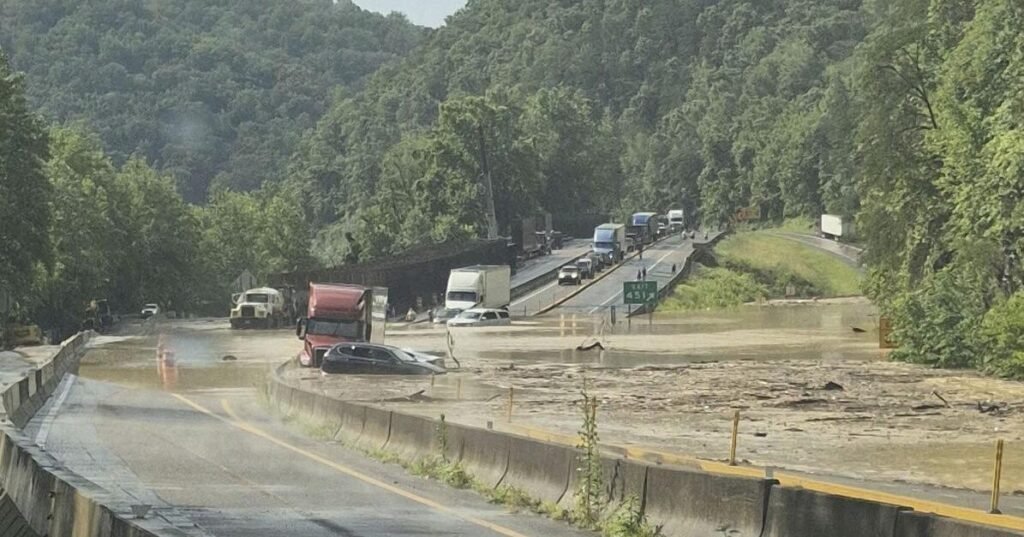I-40 Closure in Hartford, TN: Latest Updates on Flooding and Rock Slides
The winding paths of Interstate 40 through the majestic Smoky Mountains have once again been interrupted by nature’s powerful forces. As someone who’s spent years exploring and writing about these magnificent mountains, I’ve seen firsthand how the rugged terrain can sometimes remind us who’s really in charge.
What Happened on I-40 in Hartford, Tennessee?
Heavy rainfall has once again triggered flooding and a rock slide along Interstate 40 near Hartford, Tennessee, forcing officials to close a section of this vital cross-country highway. This closure affects the narrow corridor that threads through the challenging mountain terrain, creating significant disruptions for both local traffic and long-distance travelers.
For those unfamiliar with the area, Hartford sits in the eastern part of Tennessee, where I-40 navigates through some of the most breathtaking—and geologically active—sections of the Appalachian Mountains.
Why This Section of I-40 Is Particularly Vulnerable
Having explored the Smokies for years, I’ve come to understand why this particular stretch of highway faces recurring challenges:
- The steep mountain slopes that border the highway are naturally prone to erosion
- The narrow passage follows the Pigeon River gorge, limiting construction options
- The area receives significant rainfall, particularly during storm systems
- The underlying rock formations are susceptible to weathering and sliding
This isn’t the first time we’ve seen closures along this section, and locals often prepare alternative routes when heavy rains are forecasted.
Impact on Travel and Local Communities
The closure of I-40 creates ripple effects that extend far beyond the immediate area:
| Affected Group | Primary Impact |
|---|---|
| Local Residents | Extended commute times, limited access to services |
| Through Travelers | Major detours adding hours to cross-country journeys |
| Commercial Traffic | Disrupted supply chains, increased shipping costs |
| Tourism Industry | Reduced visitor numbers to Smoky Mountain attractions |
Alternative Routes for Travelers
If you’re planning travel through the area, consider these alternative routes:
- I-81 north to I-26 south for those traveling between Asheville and Knoxville
- US-25/US-70 for local traffic (though these routes may also be affected by similar conditions)
- For long-distance travelers, consider routes via I-75 or I-77 depending on your destination
Always check current road conditions before departing, as mountain weather can change rapidly and affect multiple routes simultaneously.
The Ongoing Battle Between Infrastructure and Nature
Having witnessed multiple closures along this stretch over the years, I’m always struck by the ongoing dance between human engineering and natural forces. The Tennessee Department of Transportation works tirelessly to maintain this crucial corridor, but the mountains have their own timeline.
Rock slides in this region aren’t simply inconveniences—they represent the continuing geological processes that formed these mountains millions of years ago. The same forces that created the breathtaking vistas that draw visitors to the Smokies also create these hazardous conditions.
What Happens Next?
Based on previous closures in this area, we can expect:
- Initial assessment of damage and slope stability by TDOT engineers
- Removal of debris from the roadway
- Evaluation of the hillside to determine if additional rock or soil might come down
- Installation of temporary protective measures like barriers or netting
- Gradual reopening, often with lane restrictions initially
Depending on the severity of the slide and ongoing weather conditions, closures can last anywhere from a few days to several weeks.
Staying Informed About Road Conditions
If you’re planning travel through the Tennessee mountains in the near future, here are resources to help you stay updated:
- Tennessee Department of Transportation’s SmartWay map: smartway.tn.gov
- TDOT’s Twitter feed for real-time updates: @myTDOT
- Local news stations covering Eastern Tennessee and Western North Carolina
- The 511 traveler information system (dial 511 from your phone in Tennessee)
Final Thoughts on Mountain Travel Safety
As someone who has traveled these mountain roads countless times, I always recommend extra caution during and after heavy rain events. The beauty of the Smokies comes with its own set of challenges, and respecting the power of these ancient mountains is essential for safe travel.
When alternative routes are available, consider taking them even if it adds time to your journey. The peace of mind is worth the extra miles, especially when traveling with family.
Have you experienced a road closure in the Smokies before? How did it affect your travel plans? I’d love to hear your stories in the comments below.

